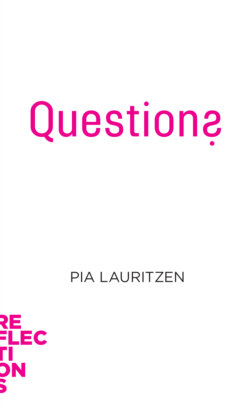Читать книгу Questions - Pia Lauritzen - Страница 5
На сайте Литреса книга снята с продажи.
CALLING QUESTIONS INTO QUESTION? “MAY I ASK YOU SOMETHING?”
ОглавлениеThis line opens many a short conversation, and it is also a fitting opening for a short book like this. The question “May I ask you something?” seldom prompts more than a one-word response, and there’s a reason for that: It’s a question that forecloses the issue at hand before even managing to raise it.
The issue at hand is whether or not we may ask a question. But in asking whether we may ask or not, we’ve already embarked on asking. We’ve already presumed that the answer is “Yes.” Which is why we sometimes don’t even wait for our question to be answered before moving on to our next question, our real question: “Which way is Main Street?” or “Do you have this in size 10?”
Some philosophers hold that the question “May I ask you something?” isn’t really a question at all, since it doesn’t permit multiple answers, but instead presupposes one specific, predefined answer. Some philosophers hold the opposite: that it’s in the nature of questions to foreclose the issues they raise. As for the rest of us, we just ask away!
We start the day by asking our loved ones whether they’ve slept well. At school, the teacher asks who wants to read out loud. At work, an employee asks about a deadline. Meanwhile, a researcher writes an article answering her carefully formulated research questions, while a journalist prepares questions for an interview. In a courtroom, the accused is sentenced to prison after failing to adequately answer the prosecutor’s questions, while elsewhere politicians do their best to offer adequate, convincing answers to every question they get, about every topic.
Life is full of questions. Ask a stupid question, and you’ll get a stupid answer. Still, if you never ask, you’ll never learn. Anyway: Who’s asking? Maybe it’s just a question of time before we run out of questions? Hmm, that’s a good question. You’ve got to ask yourself: It’s OK to ask, right? Just asking!
Our idioms, like our daily lives, are full of questions big and small; good and bad; easy, hard and frequently asked. It’s the questions we ask, and those we fail to ask, that determine whether we gain the insight we need to do our jobs. But questions are about much more than developing or getting smarter.
It is a principle fundamental to the structure of democracy that citizens can question the decisions made by their elected officials. As individuals and communities we form our perceptions of what is right and wrong, doing so in no small part against the backdrop of question-based opinion polling, interviews and interrogation techniques.
Even so – or perhaps for this very reason – people rarely call questions into question.
